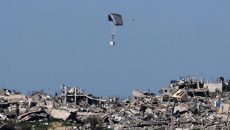The reopening of the Rafah crossing between Gaza and Egypt is very good news for the one and a half million Palestinians who live in the Strip. It frees up the only Palestinian border (by land, air or sea) that Israel doesn’t control. And after five years of isolation (the embargo was imposed by the Jewish state after the 2006 kidnapping of soldier Gilad Shalit and was reinforced in 2007, when Hamas drove Fatah out of the Strip), one would imagine that its people are in for slightly less difficult times.
But in general, is it actually good news? Israel sees it as a threat. A double threat, in fact: on the one hand, the Hamas militia and all the other extremists have greater chances of procuring weapons with which to attack the Jewish state; on the other hand, the decision to reopen Rafah shifts policies in Egypt toward more a pro-Palestinian position while the country is being governed by the military junta that has already mediated agreements between Hamas and Fatah (something else that Israel sees as a threat).
I believe that Abu Mazen, Fatah and the Palestinians in the West Bank are even unhappier than Israel. The reopening of the border bolsters Hamas just when Hamas and Fatah are poised to successfully conclude negotiations for the formation of a joint transitional government that would bring the Palestinians new elections in a year’s time. Consequently, Jordan (where 60% of the population is Palestinian) and Lebanon (the Palestinians there, refugees and non-citizens, amount to around 12% of the four million Lebanese) are also little pleased: for them, more power to the Hamas “tough guys” is bad news. All the other countries in the Middle East have other problems on their hands these days.
Even the US is said to be displeased. Something I’m not very convinced of. At the G8 summit in Deauville (France), Barack Obama pushed for a Marshall Plan to be introduced for the uprising Maghreb countries and decided to relieve a billion dollars of the debt Egypt owes to the United States and at the same time grant it a billion-dollar credit line. No politician gives away billions without getting something in return. And the Egyptian military junta certainly isn’t in any position to challenge its most generous patron solely out of its love for Hamas and the Palestinians in Gaza.
My hunch is that Obama has grown tired of grappling with the real obstacles hindering a more modern, more democratic evolution in the Middle East: on the one hand Iran and on the other hand Israel/Palestinians (or shall we say Israel/Hamas), two closely knit intransigent stances that reciprocally support each other. The US, for different yet just as strong reasons, can neither invade Iran nor abandon its policy of supporting Israel. And so, unable to change these key situations, it’s doing its best to change everything else, everything around it.
Mubarak (Egypt) and Ben Ali (Tunisia) have already been ousted. Gaddafi (Libya) is heading in that direction. Ali Abdullah Saleh (Yemen) is teetering and waiting in vain for help from the US, a traditional ally. Assad (Syria) is slaughtering defenseless citizens but the US is asking that he introduce reforms in order to put him in a difficult position without handing Syria over to Iran. In this scenario, how long can Iran and Israel hold out without giving in to changing their attitude toward the rest of the Middle East?



